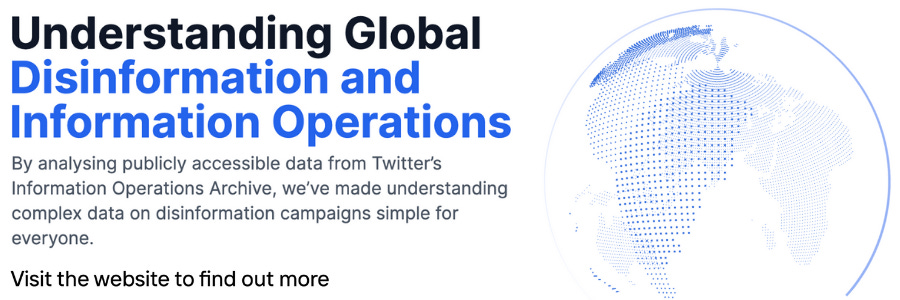Microsoft warns foreign disinformation is hitting the US election | Hong Kong restricts civil servants from using WhatsApp, WeChat and Google Drive | China cracks down on ‘uncivilised’ online puns
Good morning. It's Thursday 24th of October.
The Daily Cyber & Tech Digest focuses on the topics we work on, including cybersecurity, critical technologies, foreign interference & disinformation.
Follow us on Twitter and on LinkedIn.
As November 5 draws closer, the Microsoft Threat Analysis Center warned on Wednesday that malicious foreign influence operations launched by Russia, China, and Iran against the US presidential election are continuing to evolve and should not be ignored even though they have come to feel inevitable. WIRED
Hong Kong civil servants have been restricted from using unauthorised messaging and cloud storage services such as WhatsApp, WeChat and Google Drive on their work computers due to “severe internet safety risks”, the city’s tech minister has said. South China Morning Post
China’s internet regulators have launched a campaign cracking down on puns and homophones, one of the last remaining ways for citizens to safely discuss sensitive subjects without recriminations or censorship. The Guardian
Australia
Mike Pezzullo casts doubt on Big Tech levy, TikTok bans
Capital Brief
Anthony Galloway
Former Home Affairs boss Mike Pezzullo has warned it will be difficult for Australia to impose a levy on tech giants in isolation, saying the better way to raise revenue would be through a multinational tax supported by the United States.
Federal government's looming social media ban may be bad for isolated, marginalised teenagers
ABC News
Kerri Kapernick and Amelia Moseley
Australia will be the first in the world to ban social media for kids if the federal government goes ahead with its proposal to tighten restrictions by the end of the year. The reason for the ban? They say social media is bad for young people's mental health. But some argue the ban could be detrimental to teenagers who rely on social media to connect with marginalised and minority groups.
Understanding technology as an ecosystem is the first step to tackling online harms
The Interpreter
Miah Hammond-Errey
A controversial law to combat misinformation and disinformation was introduced into the Australian parliament in September and last week saw another round of senate hearings into the proposal. Although there is consensus that combatting mis- and disinformation is good, and that online platforms are curating content and culture in opaque ways, the bill is controversial because there are few supporters of this iteration.
China
China cracks down on ‘uncivilised’ online puns used to discuss sensitive topics
The Guardian
Helen Davidson
China’s internet regulators have launched a campaign cracking down on puns and homophones, one of the last remaining ways for citizens to safely discuss sensitive subjects without recriminations or censorship. The “clear and bright” campaign is targeting “irregular and uncivilised” language online, particularly jokes, memes, and wordplay, the Cyberspace Administration of China and the ministry of education announced this month.
Apple’s Tim Cook visits China, talks data security with minister
Bloomberg
Debby Wu
Apple Inc.’s Chief Executive Officer Tim Cook discussed investments, data security and cloud services with a senior Chinese official during his second trip to the nation this year. Cook met China’s Minister of Industry and Information Technology Jin Zhuanglong in Beijing on Wednesday, according to a post on the ministry’s WeChat account. Cook and Jin talked about Apple’s presence in China, secure management of online data and cloud services, the agency said.
USA
Microsoft warns foreign disinformation is hitting the US election from all directions
WIRED
Lily Hay Newman
As November 5 draws closer, the Microsoft Threat Analysis Center warned on Wednesday that malicious foreign influence operations launched by Russia, China, and Iran against the US presidential election are continuing to evolve and should not be ignored even though they have come to feel inevitable. In the group's fifth report, researchers emphasize the range of ongoing activities as well as the inevitability that attackers will work to stoke doubts about the integrity of the election in its aftermath.
Influence campaigns from Iran, China, Russia ramping up ahead of elections, Microsoft finds
POLITICO
Maggie Miller
Iranian hackers are gearing up for a potentially major influence operation ahead of the U.S. elections, running parallel to increased election interference efforts from China and Russia, Microsoft said in a report released Wednesday.
How Republicans pushed social media companies to stop fighting election misinformation
CNN
Brian Fung
Three years ago, major internet platforms including Meta, Twitter and YouTube responded to the January 6, 2021, Capitol riots with decisive action — suspending thousands of accounts that had spread election lies and removing posts glorifying the attack on US democracy. The public got a taste of the new normal this summer, when social media was flooded with misinformation following the attempted assassination of former President Donald Trump and the platforms said nothing.
As election looms, disinformation ‘Has never been worse’
The New York Times
Steven Lee Myers
The Democratic Party’s vice-presidential nominee has been falsely accused of sexually molesting students. The claims have been spread by a former deputy sheriff from Florida, now openly working in Moscow for Russia’s propaganda apparatus, on dozens of social media platforms and fake news outlets.
Russia is behind viral disinformation targeting Walz
Associated Press
David Klepper
Groups in Russia created and helped spread viral disinformation targeting Democratic vice presidential candidate Tim Walz, a senior U.S. intelligence official said Tuesday. The content, which includes baseless accusations about the Minnesota governor’s time as a teacher, contains several indications that it was manipulated, said the official with the Office of the Director of National Intelligence.
Justice Department warns Elon Musk that his $1 million giveaway to registered voters may be illegal
CNN
Evan Perez, Hannah Rabinowitz and Marshall Cohen
The Justice Department warned Elon Musk’s America PAC in recent days that his $1 million sweepstakes to registered voters in swing states may violate federal law, people briefed on the matter told CNN.
Inside the U.S. government-bought tool that can track phones at abortion clinics
404 Media
Joseph Cox
On a computer screen a map shows the movements of smartphones around the globe. Zooming into an abortion clinic in the south of the United States, the online tool shows more than 700 red dots over the clinic itself, each representing a phone, and by extension, a person.
The struggle for software liability: Inside a ‘very, very, very hard problem’
The Record by Recorded Future
Eric Geller
Six years after Congress tasked a group of cybersecurity experts with reimagining America’s approach to digital security, virtually all of that group’s proposals have been implemented. But there’s one glaring exception that has especially bedeviled policymakers and advocates: a proposal to make software companies legally liable for major failures caused by flawed code.
North Asia
TSMC cuts off client after discovering chips sent to Huawei
Bloomberg
Debby Wu
Taiwan Semiconductor Manufacturing Co. discovered this month that chips it made for a specific customer ended up with Huawei Technologies Co., a potential violation of US sanctions intended to sever the flow of technology to a Chinese national champion.
US lawmaker demands answers on TSMC chip in Huawei device
Reuters
The Republican chairman of the U.S. House of Representatives Committee on China demanded answers on Wednesday from the Commerce Department and TSMC after a chip made by the Taiwanese company was found in a device made by China's Huawei.TSMC says it alerted US to potential violation of China AI chip controls
Financial Times
Kathrin Hille
Taiwan Semiconductor Manufacturing Company has said it alerted the US government to a potential attempt to have it manufacture artificial intelligence chips for Chinese technology group Huawei in circumvention of export controls.
Taiwan eyes support hubs for chipmakers in Japan, U.S. expansion
Nikkei Asia
Hideaki Ryugen
Taiwan is considering setting up support hubs to encourage its semiconductor companies to invest overseas, focusing on promising destinations such as Japan and the US.
Southeast Asia
Hong Kong restricts civil servants from using WhatsApp, WeChat and Google Drive at work
South China Morning Post
Lo Hoi-yingandEdith Lin
Hong Kong civil servants have been restricted from using unauthorised messaging and cloud storage services such as WhatsApp, WeChat and Google Drive on their work computers due to “severe internet safety risks”, the city’s tech minister has said.
South & Central Asia
Researchers in Japan test technology for solar power generation from space
NHK World Japan
Researchers in Japan have conducted a preliminary experiment as part of a project to generate solar power in space and send it back to Earth.The idea is to set up geostationary solar panels in space at an altitude of 36,000 kilometers, and convert the generated electricity into microwaves for transmission back to Earth. The project team is hoping the technology can be put into practical use from 2045 at the earliest.
Europe
Polish radio station replaces journalists with AI ‘presenters’
Associated Press
Vanessa Gera
A Polish radio station has triggered controversy after dismissing its journalists and relaunching this week with AI-generated “presenters.” Weeks after letting its journalists go, OFF Radio Krakow relaunched this week, with what it said was “the first experiment in Poland in which journalists ... are virtual characters created by AI.”
Germany’s chip ambitions hit after US tech group shelves plans for plant
Financial Times
Guy Chazan
Chancellor Olaf Scholz’s ambitions to turn Germany into a powerhouse in the chip industry have suffered a fresh blow after US tech company Wolfspeed shelved plans to build a factory in the country, prompting the opposition to claim his industrial policy was in tatters.
World Uyghur Congress faces security breach ahead of 8th general assembly
ANI News
The World Uyghur Congress had to face a security breach after its employee's email account was hacked on Monday, falsely asserting that the organisation's general assembly in Sarajevo has been postponed, Voice of America reported. The Washington-based international broadcaster stated that the mail was sent to all attendees, consisting of WUC delegates, foreign lawmakers and other candidates.
Africa
Nigeria court releases binance executive detained for months
Bloomberg
Nduka Orjinmo
The Nigerian government dropped charges against a Binance Holdings Ltd. executive standing trial on allegations of money laundering and currency manipulation, who had been detained in the country since February.
Gender and Women in Cyber
The untapped potential of women in cybersecurity
Forbes
Shelley Zalis
As of 2022, women make up only 25% of the cybersecurity workforce. This statistic reflects a broader gender imbalance in STEM fields and highlights a critical talent gap that is expected to grow, with millions of job vacancies anticipated by 2025.
Big Tech
Meta to use facial recognition technology in fight against celebrity investment scam ads
The Guardian
Josh Taylor
Meta is fighting the scourge of celebrity investment scam ads with facial recognition technology to detect those who most often have their images used. The parent company of Facebook and Instagram announced on Monday it would begin trialling the use of facial recognition technology with a select pool of 50,000 celebrities or public figures worldwide on an opt-out basis in December.
Meta criticised for calling its AI models ‘open-source’
Financial Times
Richard Waters
Meta has been criticised for calling its artificial intelligence models “open-source” by the group that has spearheaded open-source technology in the software world for the past 25 years.
Oversight Board says Meta’s handling of a satirical image of Harris and Walz raises ‘serious concerns’
Engadget
Karissa Bell
Two weeks before the US presidential election, the Oversight Board says it has “serious concerns” about Meta’s content moderation systems in “electoral contexts,” and that the company risks the “excessive removal of political speech” when it over-enforces its rules. The admonishment came as the board weighed in on a case involving a satirical image of Vice President Kamala Harris and her running mate, Minnesota Governor Tim Walz.
Artificial Intelligence
Can AI be blamed for a teen’s suicide?
The New York Times
Kevin Roose
The mother of a 14-year-old Florida boy says he became obsessed with a chatbot on Character.AI before his death. Sewell, a 14-year-old ninth grader from Orlando, Fla., had spent months talking to chatbots on Character.AI, a role-playing app that allows users to create their own A.I. characters or chat with characters created by others.
Former OpenAI researcher says the company broke copyright law
The New York Times
Cade Metz
Suchir Balaji spent nearly four years as an artificial intelligence researcher at OpenAI. Among other projects, he helped gather and organize the enormous amounts of internet data the company used to build its online chatbot, ChatGPT. In August, he left OpenAI because he no longer wanted to contribute to technologies that he believed would bring society more harm than benefit.
Misc
Internet Archive and Wayback Machine are down again
Mashable
Chance Townsend
Just a day after the Internet Archive posted the restoration of its Wayback Machine and other services on its blog, the site has gone dark again. As of this writing, a visit to the Archive’s homepage shows a message confirming that while Archive-It and its blog are back online, the rest of the Internet Archive’s services remain temporarily unavailable.
Roblox to enact child-safety changes giving parents more control
Bloomberg
Cecilia D'Anastasio and Olivia Carville
Roblox Corp., the video-game platform popular with preteens, is instituting a number of reforms following widespread criticism of its child-safety policies and the arrests of alleged child abusers using the service.
Research
Foreign influence and democratic governance
Council on Foreign Relations
Miles Kahler
To adequately address foreign influence in the domestic politics of the United States and its democratic allies, malign foreign influence should be defined and assessed, countermeasures developed, and the risks associated with those responses carefully evaluated. Successful defense against malign foreign influence in democracies will resonate with a wider global audience that embraces self-determination—the right of a country to determine its own future political path.
Battles of precise mass: Technology is remaking war—and America must adapt
Foreign Affairs
Michael C. Horowitz
At the beginning of the war in Ukraine in 2022, Ukrainian forces deployed a handful of Turkish-made Bayraktar TB2 uncrewed aerial vehicles to hit Russian targets. Those precise drone strikes were a sign of things to come. More than two years into the war, the TB2 is still a fixture of Ukraine’s arsenal, but it has been joined by a plethora of other uncrewed systems. Similar technology features in the current conflicts in the Middle East. Iran, Hezbollah in Lebanon, and the Houthis in Yemen launch one-way attack systems (drones armed with explosives that slam into their targets) and missiles at Israel, commercial shipping, and the U.S. Navy. For its part, Israel is using a range of unmanned vehicles in its war in Gaza. China is exploring ways to use uncrewed systems to blockade Taiwan and prevent outside powers from helping the island in the event of a Chinese attack. And the United States has launched several initiatives to help it rapidly field affordable uncrewed systems at greater scale. In all these cases, advances in artificial intelligence and autonomous systems, combined with a new generation of commercially available technologies and reduced manufacturing costs, are allowing militaries and militant groups to bring “mass” back to the battlefield.
The Daily Cyber & Tech Digest is brought to you by the Cyber, Technology & Security team at ASPI.








